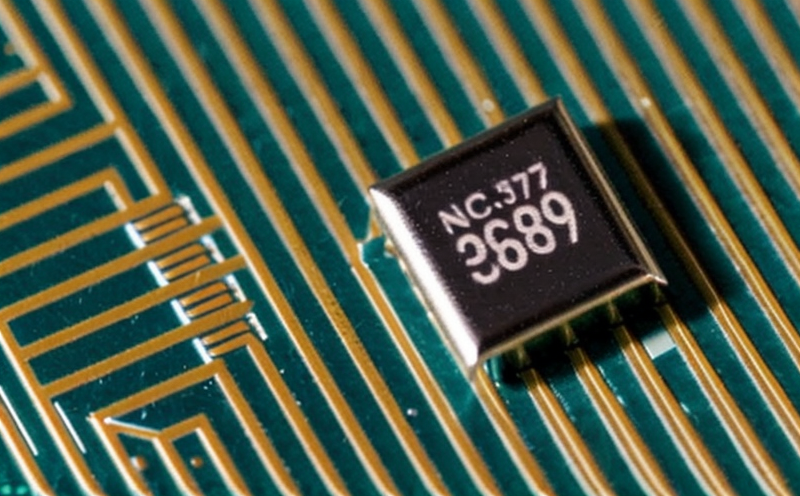JEDEC JESD22-A150 Microchip Thermal Resistance Endurance Testing
The JEDEC JESD22-A150 standard is a critical benchmark for assessing the thermal reliability of microchips. This testing method evaluates the maximum operating temperature that a microchip can withstand without failing, ensuring its long-term stability and performance in various environments.
During this test, the microchip is subjected to extreme temperatures over an extended period. The goal is to assess whether the device retains its electrical functionality and structural integrity under these conditions. This process helps manufacturers identify potential weaknesses or design flaws that could lead to premature failure.
The testing procedure typically involves placing the microchip in a controlled environment where it is subjected to temperatures ranging from -55°C to 125°C, with precise temperature cycling and dwell times defined by the standard. The specimen preparation includes cleaning the chip thoroughly before placing it into the test chamber.
The equipment used for this testing includes advanced thermal chambers capable of maintaining high precision over extended durations. These chambers are equipped with sensors to monitor temperature fluctuations in real-time, ensuring accurate data collection throughout the process.
The acceptance criteria for JESD22-A150 are stringent and designed to ensure that only reliable microchips pass this test. A successful outcome means the chip maintains its electrical performance within specified limits despite exposure to extreme temperatures multiple times. This level of reliability is essential in industries like automotive, aerospace, and consumer electronics where components must operate reliably under harsh conditions.
Real-world applications benefit significantly from such rigorous testing protocols. For instance, automotive manufacturers can use this data to ensure that their vehicles' electronic systems remain functional even when exposed to extreme heat generated during driving or parking in hot climates. Similarly, aerospace companies leverage these results to guarantee the safety and longevity of space exploration equipment.
Understanding the nuances of JESD22-A150 is crucial for quality managers responsible for ensuring product compliance with industry standards. Compliance officers need accurate documentation supporting regulatory requirements while R&D engineers rely on reliable test data when refining designs aimed at improving microchip reliability.
In summary, JEDEC JESD22-A150 thermal resistance endurance testing plays a vital role in enhancing the overall quality and dependability of semiconductor products. By adhering strictly to this standard, manufacturers can produce more robust and durable components capable of meeting diverse environmental demands.
Scope and Methodology
The scope of JEDEC JESD22-A150 testing encompasses a comprehensive evaluation of microchip thermal resistance over time. This involves subjecting the device to extreme temperatures through precise temperature cycling within defined parameters.
- Temperature Range: -55°C to 125°C
- Dwell Times: Specified by Standard
- Repetitions: Multiple Cycles as Required
The methodology for conducting these tests includes thorough cleaning of the microchip prior to testing, placing it into a controlled environment capable of maintaining precise temperature conditions. Sensors within the chamber continuously monitor and record temperature changes during each cycle.
Once the test is complete, detailed reports are generated highlighting key performance metrics such as temperature stability, electrical resistance, and overall durability. Compliance with specified limits ensures that only those microchips meeting rigorous criteria pass this stringent evaluation process.
Customer Impact and Satisfaction
The results from JEDEC JESD22-A150 testing significantly impact customer satisfaction across multiple sectors. Automotive manufacturers gain confidence knowing their electronic systems will perform reliably in all conditions, enhancing overall vehicle safety.
- Aerospace companies can trust that critical components used in space missions or aircraft won't fail due to temperature extremes.
- Consumer electronics firms improve user experience by delivering devices with consistent performance and extended lifespans.
Through robust testing, these industries not only meet but exceed regulatory requirements, fostering trust among end-users. Positive feedback from customers underscores the importance of adhering to such stringent standards.
Environmental and Sustainability Contributions
By ensuring microchips are highly reliable and durable through rigorous testing like JESD22-A150, we contribute positively to environmental sustainability. Extended product lifespans mean less electronic waste and reduced resource consumption.
The manufacturing industry benefits from increased efficiency in production processes as they refine designs based on test results. This leads to better utilization of resources and energy savings throughout the supply chain.





